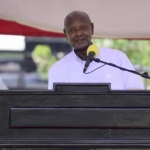Edgar Lungu, the former President of Zambia, passed away on June 5, 2025, at the age of 68, at a clinic in Pretoria, South Africa, where he was receiving treatment for an undisclosed illness. He leaves behind a complex legacy that reflects both the challenges and opportunities of his leadership. During his presidency, from 2015 to 2021, Lungu navigated a tumultuous period in Zambia’s political and economic landscape. His tenure was marked by significant events that shaped the nation’s trajectory, and his impact continues to be felt in the country’s ongoing development.
Born on November 11, 1956, Lungu’s rise to power was marked by his appointment as Minister of Defense and later as President following the death of Michael Sata. He won a special presidential election in 2015 and a full term in 2016, demonstrating his ability to rally support from the Patriotic Front party and the Zambian people. His presidency was characterized by efforts to stabilize the economy, improve infrastructure, and address social issues.
Despite his efforts, Lungu’s presidency faced criticism for the country’s economic struggles, including high unemployment and debt accumulation. The Zambian economy experienced significant challenges during his term, with fluctuations in copper prices and external debt impacting economic stability. Critics argue that these issues were exacerbated by fiscal policies and a lack of robust economic reforms.
Lungu’s political career was also defined by his loss to Hakainde Hichilema in the 2021 elections. This transition marked a significant shift in Zambia’s political landscape, with Hichilema’s presidency promising new directions for economic management and governance. Lungu’s attempts to contest the outcome and his subsequent acceptance of the results reflected both the resilience and challenges of Zambia’s democratic processes.
After leaving office, Lungu’s political activities continued to influence Zambian politics. His attempts to stage a political comeback were met with legal challenges, underscoring the complexities of political transitions and the interpretation of constitutional term limits. Despite these challenges, Lungu’s legacy is a testament to the dynamic nature of Zambian politics and the ongoing dialogue about leadership, governance, and economic development.
In conclusion, Edgar Lungu’s presidency and legacy are a reflection of the broader themes in Zambian history, including economic development, political stability, and the evolution of democratic governance. His impact on the country continues to be a subject of discussion and analysis, as Zambia moves forward under new leadership.



